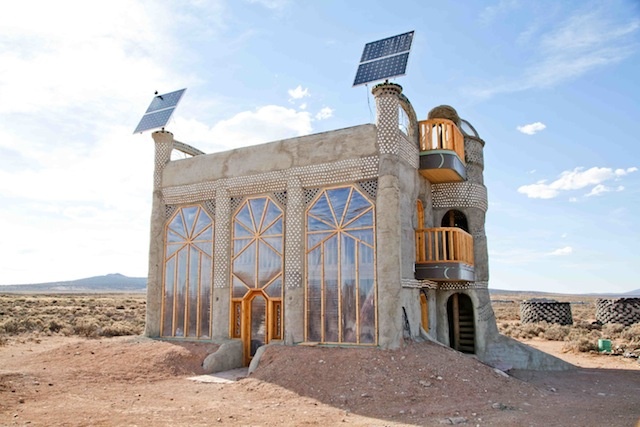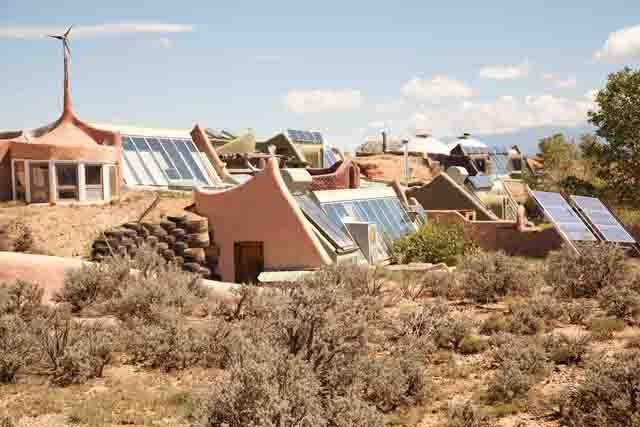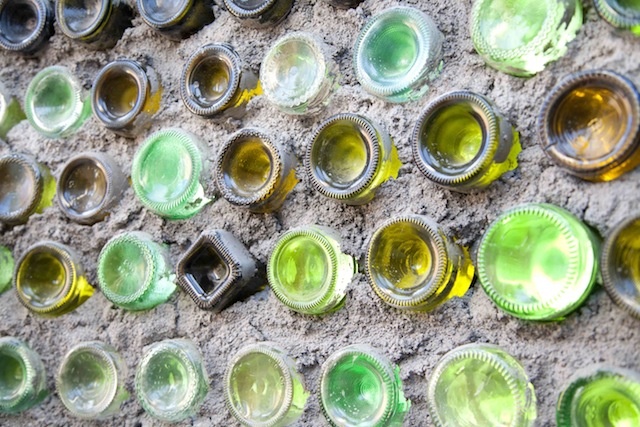
Advertisement

Michael Reynolds: When you get in a situation where all of your utilities come directly to you from the sun, wind, and rain, it empowers you. So what if the economy crashes? So what if the politics don’t work out? People are still in charge of their lives. The biggest change that happens is that p eople become less dependent on the powers that be and more secure in their own being.Is that what you had in mind in the early 70s when you first started?
No. I didn’t have a master plan. I just followed my nose, responding to one thing and then another. I wanted to make the buildings out of things we throw away rather than cutting down trees. Then I wanted to harvest my own water because water’s getting to be an issue all over the planet. I wanted to make my own power so I wouldn’t be vulnerable to power outages and reinforce the need for nuclear power plants. Then I started seeing that sewage was not being treated right anywhere on the planet, so I wanted to be responsible for my own. And I didn’t like the food that I purchased, even in health food stores. It’s still grown for money and has dyes and all kinds of chemicals in it, so I wanted to do my own food. One thing led to another, and now I live an absolutely independent, decentralized method of living.
Advertisement
The idea started out from the ease of producing hard-edged materials and shipping them. Every building you see is a square box. But look at nature—a wasp nest or a beaver dam. It feels a lot better on your mind to be in a soft organic building than it does to be in a hard-edged, industrial-type building.I’ve read that your building methods have brought you into conflict with government regulators. What has that been like for you?
It’s educational. It’s not anybody’s fault. Those laws all evolved from an effort to protect the people, but it’s like an ingrown toenail now. It’s out of control. It’s time to evolve beyond those things. The regulations are inhibiting human evolution at this point. And so, I’m not going to fight them anymore, because that’s a waste of energy.Where did the term Earthship come from?
We didn’t want the buildings to be called “houses” because “house” has a preconceived idea about it. These are machines. They’re a type of phenomena that the Earth uses to provide sustenance for people. It seemed like they were a kind of vessel, vessels of the future, and they’re on the Earth, so we ended up calling them Earthships.

We’re drawing up blueprints for a project that is being well received by the council. Manhattan had a hard time this winter with the hurricane when the power went out. People were freezing. Their sewage didn’t work and neither did their water. Now they’re looking for any kind of help they can get.
Advertisement
Yep. Well, we can show them something different with this method of living.So, how is that Earthship going to be configured?
It’s a two-story Earthship built on a vacant lot between two brownstones on Pitt street. It’s a ten-minute walk from the Empire State building. We’re using an 80-foot tall mirror to reflect sunlight down onto the Earthship over the roof of a six-story building.When will you break ground?
There’s a chance it’ll be next summer. It’s a slow process, because of the permits and also the developers are in the process of getting funding.One of your goals is for your buildings to be less expensive than more traditional housing. But from what I can tell, they cost approximately the same.
Yeah, the one standard, what we call the global model, costs about the same as a conventional home of a similar size and quality. And that was a good first step. But, conventional housing is too expensive. Too many people can’t afford it. So we’re trying to present this in a much more simplified way that makes it more available to more people.I read that you were building very basic Earthships in Haiti after the earthquake that cost just a few thousand dollars. Is that the sort of direction you’re talking about moving in?
Yeah. We’re going for what we call “simple survival.” And there are a lot of people sleeping on a park bench who would see that as a viable option.
Advertisement
In some cases we are, and in some cases we’ll be outlawing it.Outlawing it? That sounds tough. It’s difficult to beat the government.
Yeah, you just have to get further away from them than they can reach.So, maybe build an actual ship out on international waters?
Yeah, stuff like that. Or up in the mountains or the desert. No building regulator is ever going to come to where I am right now. They’re not going to walk 40 minutes uphill. And, it’s beautiful here. There are a lot of places like this all over the world.

No, once we show how these work, it’s possible to get tracts of land where we can demonstrate. You know, they test airplanes, cars, drugs, and atomic bombs—why can’t we test a new method of living?You’re referring to the governor of New Mexico giving you this land to work on free of regulation, right?
Yeah. I’m finding that every government, no matter how wealthy, is a little bit worried about housing right now. They’re starting to see the benefits of self-sufficiency.Are you anticipating a government collapse?
What I see right now is pitiful, so I expect it to continue to get worse. People are on a treadmill in the developed world. And in the underdeveloped world, they’re being exploited.
Advertisement
If we keep growing exponentially, we could be a threat. Right now, we’re just too small for them to worry about.Ultimately though, if this lifestyle is ever adopted on a large scale, it would be a revolution.
I don’t know if I want to use that word, because there’s always been blood and disaster in revolution. We will just transcend. You know, if you don’t need a nuclear power plant, you have to transcended the need for it. If you don’t need a public water system, you have transcended that as well. The same goes for money. We’re not trying to fight them and change them, we’re just going away from them—rising above, rising beyond.The only thing I would say is that you might not need the power plant, but the owner of the power plant needs you to need the power plan. That’s where the conflict could come in.
Yeah, but by the time they realize nobody needs their stuff anymore, it’s going to be too late.Roc’s new book, And, was released last year. You can find more information on his website.More from VICE:The Nightstalker Is a Gentle Giant Obsessed With Serial Killers and Occult SexHalloween in a Satanic HouseholdSexx Money's Open Letter to Miley Cyrus
